- Caffeine & Chaos By Zubin
- Posts
- Product Marketing's Role in a GTM Strategy
Product Marketing's Role in a GTM Strategy
TLDR: Own a lot, support everything
Launching a new product is a monumental task that requires meticulous planning and execution. A critical component of this process is the Go-To-Market (GTM) strategy, which outlines how a product will be sold and marketed to customers. One department that plays a pivotal role in shaping and executing a GTM strategy is Product Marketing. In this comprehensive guide, we will delve deep into the various facets of Product Marketing's role in a GTM strategy for a successful product launch.

What is Product Marketing?
Product Marketing is a specialized function that serves as the nexus between product development, marketing, and sales. It aims to understand customer needs, market dynamics, and business objectives to position a product effectively in the marketplace. The role goes beyond traditional marketing to include responsibilities like market research, product positioning, messaging strategy, and much more.
Key Responsibilities
Market Research: This involves a deep dive into market trends, customer pain points, and the competitive landscape. The insights derived from this research inform various aspects of the GTM strategy.
Product Positioning: Product Marketing defines how a product or service is uniquely positioned against competitors, articulating its unique value proposition.
Messaging: Crafting compelling narratives and key messages that will resonate with target audiences is a key responsibility. This messaging serves as the foundation for all marketing materials.
Pricing Strategy: Deciding how a product will be priced requires a nuanced understanding of customer willingness to pay, competitor pricing, and overall market trends.
Sales Enablement: Product Marketing provides the sales team with the resources needed to sell the product effectively, including sales collateral, training materials, and customer testimonials.
The Role in a Go-To-Market Strategy
Market Segmentation
One of the first steps in formulating a GTM strategy involves breaking down the broader market into smaller segments. Each segment consists of potential customers with similar characteristics, pain points, or behavior. Product Marketing uses quantitative and qualitative research methods to identify and prioritize these segments.
Why is Market Segmentation Important?
Targeted Messaging: Different segments have different needs. Market segmentation allows for the customization of messaging to better resonate with each group.
Resource Allocation: Not all market segments are equally profitable or easy to penetrate. Segmentation helps in prioritizing efforts and allocating resources more effectively.
Positioning and Messaging
Crafting a Positioning Statement
A positioning statement is a succinct description that outlines the target market, the problem the product solves, and why it's better than alternative solutions. Product Marketing collaborates with product management and leadership to finalize this statement, which serves as the cornerstone for all external communications.
Developing Key Messages
Based on the positioning statement, Product Marketing develops a set of key messages. These messages are tailored for different audience segments and serve as the foundation for marketing collateral, such as advertisements, press releases, and social media posts.
Pricing and Packaging
Conducting Pricing Research
Product Marketing often employs techniques like conjoint analysis, competitor benchmarking, and customer interviews to arrive at an optimal pricing strategy.
Determining Packaging Options
How a product is packaged can also influence its perception and value. This can include bundling features, offering tiered pricing models, or providing customization options. Product Marketing works closely with the product management team to finalize these details.
Channel Strategy
Identifying Distribution Channels
Whether it's direct sales, third-party retailers, or an online marketplace, selecting the right distribution channel is crucial. Product Marketing assesses the pros and cons of each channel to determine the most effective route to market.
Channel Partner Enablement
In cases where third-party retailers or resellers are involved, Product Marketing creates specialized training materials and sales collateral to enable these partners to sell the product effectively.
Launch Execution
Coordinating Cross-Functional Teams
Executing a product launch is a cross-functional effort involving departments like sales, marketing, customer support, and product management. Product Marketing often serves as the orchestrator, ensuring that all teams are aligned and informed.
Monitoring and Reporting
Once the product is launched, it's crucial to monitor various KPIs like customer acquisition costs, customer lifetime value, and net promoter scores. These metrics provide insights into the effectiveness of the GTM strategy and what adjustments may be needed.
The Symbiotic Relationship with GTM
The GTM strategy is not a static document but a dynamic plan that evolves based on market feedback and performance metrics. Product Marketing plays a continuous role in this evolution, providing data-driven insights to refine and optimize each aspect of the GTM strategy.
Conclusion
In a GTM strategy for a product launch, Product Marketing is not just a contributor but often the linchpin that holds the entire strategy together. From the initial stages of market research to the final steps of launch execution and performance monitoring, Product Marketing plays a multifaceted role that can significantly impact a product's market success.
By effectively leveraging Product Marketing in your GTM strategy, you increase your chances of not just a successful product launch but also long-term product success.